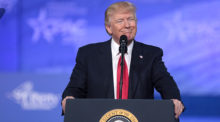Daviel Lazure-Vieira
Just over year ago, Donald Trump was elected president of the United States. Back in November 2016, we asked Ronald Pruessen, affiliated faculty at the Munk School’s Centre for the Study of the United States and professor at the University of Toronto’s Department of History, to share his thoughts on the electoral campaign and Trump’s presidential bid. Since then, Pruessen has frequently provided commentary on the Trump presidency, writing for the London School of Economics and Newsweek about how politics have turned into a spectacle or assessing the possibility of impeachment given Trump’s many controversies. Now that a year has passed since the 2016 U.S. election, we talk to Pruessen about the current state of affairs in America under Trump.
In your opinion, what is the single most significant change since Donald Trump’s election a year ago?
Americans have reached a point where the dividing line between popular culture and politics is disappearing. I worry about the normalization of a political culture in which a combination of extremism, crudity, and absurdity seem to have become predominant. It’s bad enough to live with Trump’s bizarre rants and tweets, with mounting details of Russian burrowing into Facebook and Twitter troll factories, with White House and Congressional efforts to butcher hard-won health care and immigration policies. It would be worse yet if this came to be seen as the new normal – leading citizens to adapt their own behaviour to the arena’s bloody, cartoonish colouration or to shrug and stop being shocked by the thought that CNN or MSNBC are not the same as HBO and TSN.
We learned something about American democracy over the past year, especially when it comes to the roles of the three branches of government – the executive, the legislative, the judicial. To what extent is this representative of the inner workings of the U.S. government, and what are the lessons of Trump’s presidency thus far?
We’ve learned that some of the most admired strengths of the American political system have the potential to be grave weaknesses, as well. The Founding Fathers’ great concern for using “checks and balances” to lessen chances of authoritarian rule or the repression of minority rights, for instance – which generated a constitution that gave important powers to three separate branches of government – can actually lead to far more “checks” than “balance” under altered circumstances. James Madison, Alexander Hamilton, and others did not envision a political arena profoundly distorted by gerrymandered electoral districts, prone to crude oversimplification by social media like Twitter, and corrupted by infusions of vast sums of money from both within and outside the United States. The chasm that separates 18th-century conceptions of Second Amendment rights from the staggeringly destructive power of the 21st-century automatic weaponry flooding American markets is one horrible example of the way an often-admirable system can be gamed (or game-of-throned).
Trump’s presidency revealed existing divisions within the Republican Party. What does it say about the current state of the Republican Party?
The G.O.P. is a Fast and Furious car wreaking havoc as it barrels across the landscape. Republicans prevented meaningful action on serious problems during the Obama years (infrastructure and gun control, to cite just two examples) and they’re now routinely acting as if they can unilaterally rejig speed and hit-and-run laws as they fancy: among other head-shaking examples, changes to voting routines on Capitol Hill, approvals for Trump’s highly dubious appointees, slash and burn efforts on Obamacare, and – current winner of the trophy for egregiousness – the tax “reform” initiative. Curiously, the only thing keeping this car’s roadway death toll less severe than it might otherwise be is the fact that the G.O.P.-ers are wrestling with each other for control of the steering wheel, even if that means they’re sometimes actually driving a clown car.
What is the biggest task awaiting Democrats in the coming months, and how can they effectively offer an alternative when it comes to the midterms next year?
The Fast and Furious Republicans vs. the Democrats’ K-car in need of repairs? The former is frightening, the latter frustrating – given the national and global problems needing more serious attention than Trump and his enablers are offering, and the damage that is being done while we wait for constructive engagement. It doesn’t help that Democrats can be as divided and confused as their G.O.P. counterparts when it comes to the auto shop diagnostics, with generational and policy preference clashes. Given Hillary Clinton’s defeat – and the legacy of the Sanders challenge on the way there – this was likely inevitable. It could also be healthy for the party, the country, and the world. The recent November 7 election has shown some positive road test results for the Democrats, but the 2018 highway, not to mention 2020, remains a daunting challenge.
November 15, 2017
